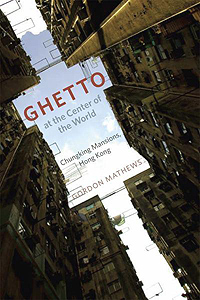
Buy it from Amazon
FYI, these are sometimes referral links!
| Subtitle | Chungking Mansions, Hong Kong |
| First Written | 2011 |
| Genre | Non-fiction |
| Origin | HongKong |
| Publisher | University of Chicago Press |
| ISBN-10 | 0226510204 |
| ISBN-13 | 978-0226510200 |
| My Copy | library paperback |
| First Read | March 17, 2012 |
Ghetto at the Center of the World
Hong Kong University professor Gordon Mathews has written an ethnography of one building - the infamous Chungking Mansions at the center of Tsim Sha Tsui in Hong Kong. This is totally fascinating, and filled with the real stories of the residents and businesspeople of Chungking Mansions.
Mathews initially describes it as "the haunt of South Asian merchants, African entrepreneurs, Indian temporary workers, African and South Asian asylum seekers, and penurious travelers from across the globe. It is a ramshackle building in Hong Kong's tourist district that is a hub of 'low end globalization', tightly linked to the markets of Kolkata (Calcutta), Lagos, and Dar es Salaam."
As a former HK resident myself, I'm familiar with the building - I lived nearby. Local Hong Kongers spoke of the building with a mixture of fear and shame, and I thought the building was always completely fascinating - one tiny hub of commerce and cultural mixing. I only breezed through the building a few times, picking up a beer or samosa on my way, but every time I got the sense that I really did not belong there.
The book does a great job at telling the stories of the people who live and work there today, and his description of the used mobile phone market is especially good. Ever wonder what happens when old phones are donated and resold? Many of them come through this one building, where they are packaged up and resold to the third world. Enterprising businesspeople from Africa can pay for round-trip airfare from Dar es Salaam to Hong Kong, all with the profits on two suitcases full of used cell phones.
While Mathews' writing has the irritating wavery voice of academia ("While on the whole … on the other hand … it is not without merit that some say…"), the pacing and storytelling is completely fascinating.
Noted on March 17, 2012
It is impossible to know for certain the scale of trade in Chungking Mansions. My rough estimate is that some 20 percent o the mobile phones presently in use in Sub-Saharan African have been sold in Chungking Mansions, judging from sales in 2007 and 2008.
Quoted on March 17, 2012
Those who have come to Chungking Mansions, even if they have been persecuted and have fled in the case of asylum seekers, nonetheless have enough money to fly to Hong Kong, something that the vast majority of their compatriots cannot ever do. This reveals that they are among the elite of their home societies. Chungking Mansions is basically a 'club of the third-world successful," including even those at its lowest stations, despite the downtrodden status they may suffer in Hong Kong.
Quoted on March 17, 2012
The interactions are generally in English, the lingua franca of Chungking Mansions. Language usage is fascinatingly nested in Chungking Mansions., with different speakers finding the closest and most intimate language in which they can speak. Speakers of African ethnic languages delight when they find one another, as I have seen, for example, with two speakers of Hausa or of Luo. They speak a language that their fellow Africans cannot understand, just as speakers of Punjabi and Bengali communicate while to some extent ignoring their fellow South Asians. At a more generalized level, speakers of Hindi-Urdu can communicate with their fellows from across the South Asian subcontinent, as speakers of Swahili or of French can communicate with some of their fellow East or West Africans. At a general level above this is English. Those Africans who don't speak English tend to congregate not at Chungking Mansions, but in Guangzhou's Tianxiu building, among other areas, where French as well as Mandarin prevail.
Occasionally other common languages emerge in Chungking Mansions. I had dinner one night in a food stall at which a Bangladeshi, and Cameroonian, and I all wound up conversing in Japanese. The Bangladeshi lives in Japan and goes to university there, and the Cameroonian sitting next to me, who had spent several years in Japan, joined in. We drew quite a crowd…I also once spoke with two businesspeople, one from Somalia, the other from Iraq, who, once they found out they had both lived in Sweden for the past ten years, began conversing with one another in Swedish, ignoring me.
Quoted on March 17, 2012
I seek in this book to celebrate Chungking Mansions in its extraordinary and largely harmonious cultural diversity. It is an amazing place, one that should be lauded in Hong Kong and the world over. At the same time, however, much of what goes on in Chungking Mansions is not fully legal… My assumption is that whereas the illegalities in Chungking Mansions are widely known, the wondrousness of the place is not, and that is what, in part, I attempt to convey in this book.
Quoted on March 17, 2012
Chungking Mansions... is the haunt of South Asian merchants, African entrepreneurs, Indian temporary workers, African and South Asian asylum seekers, and penurious travelers from across the globe. It is a ramshackle building in Hong Kong's tourist district that is a hub of 'low end globalization', tightly linked to the markets of Kolkata (Calcutta), Lagos, and Dar es Salaam, among other cities across the globe. Although Chungking Mansions is seen by many in Hong Kong as a mysterious world of otherness strangely set in Hong Kong's very heart, it isn nonetheless distinctly shaped by Hong Kong.
Quoted on March 17, 2012